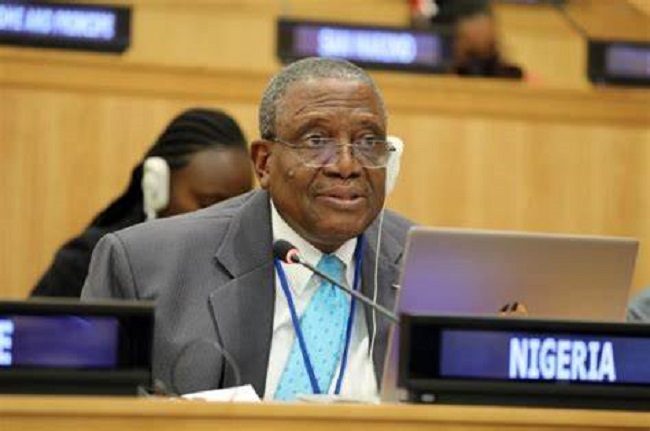An environmental expert, Prof. Babajide Alo, says Nigeria stands to benefit significantly from the economic and environmental opportunities offered by the newly adopted international ocean treaty.

Alo, who disclosed this in interview on Sunday, June 22, 2025, in Lagos, said the treaty would promote sustainable use of ocean resources, create jobs, and open Nigeria to global benefit-sharing mechanisms.
The recently signed ocean treaty, also known as the High Seas Treaty or Biodiversity Beyond National Jurisdiction (BBNJ) Agreement, aims to protect marine biodiversity in areas beyond national jurisdiction, covering over 64 per cent of the world’s oceans.
It aims to safeguard biodiversity in the two-thirds of the ocean that lies outside of national jurisdictions.
This landmark agreement is expected to usher in a new era of ocean governance and offer opportunities for sustainable use of marine resources.
This historic agreement was adopted by the United Nations in June 2023, after nearly two decades of negotiations.
Alo, Nigeria’s lead negotiator for the BBNJ Treaty, described the treaty as a landmark agreement with the potential to revolutionise the way we manage and conserve the world’s oceans.
“The BBNJ Treaty, also known as the High Seas Treaty, aims to regulate areas beyond national jurisdiction, which covers approximately 75 per cent of the world’s oceans.
“These areas, often referred to as the ‘high seas,’ are crucial for sustaining human life, and their conservation is essential for the health of our planet.
“Nigeria actively participated in the negotiations, recognising the potential benefits of the treaty, including access to new areas for oil and gas exploration, as well as diverse biological resources,” he said.
The expert said that, with the treaty in place, Nigeria and other countries would have the opportunity to access and benefit from the vast resources of the high seas.
“These will include marine genetic resources, which have the potential to lead to breakthroughs in medicine and other fields.
“There is no doubt that Nigeria can benefit immensely from the vast resources and opportunities provided by the ocean.
“With this new treaty now in place, particularly through the implementation of Environmental Impact Assessments (EIAs), we have an opportunity for both economic growth and sustainable development.
Alo noted that the EIAs were critical tools that guide responsible exploitation of marine resources, helping to protect biodiversity while enabling economic activity.
“If all marine-related activities are carried out with the EIAs in place, Nigeria can achieve long-term sustainability in ocean use,” he said.
He added that the treaty would bring social and economic benefits, particularly in job creation and foreign revenue.
“As we implement the elements of the treaty, there will be demand for people who will go out and cultivate marine genetic resources.
“The capturing and study of new marine species, for example, will feed into research and industry. From medicine to cosmetics, ultimately benefiting the economy,” he said.
Alo expressed optimism that Nigerian leaders would recognise the potential and act swiftly.
“We are praying and hoping that our leaders will quickly see the value in this initiative.
“The benefits will not only create jobs but also bring new revenue streams through a global fund attached to the treaty.
According to him, once Nigeria becomes a party to the treaty, it will be eligible to access this fund, which is designated for countries contributing to the implementation of its objectives.
“Benefit sharing is a key element in the treaty. I cannot put exact figures now, but it could run into millions of dollars,” he said.
Alo also called for urgent policy reforms to tackle marine pollution and illegal fishing.
“We need to strengthen pollution control measures so that our oceans are less polluted.
“Also, illegal fishing in our coastal waters must be addressed through enforceable policies. Reducing these activities will boost our marine economy and preserve our resources.
“The new treaty, adopted under the United Nations framework, is aimed at conserving and sustainably using marine biological diversity in areas beyond national jurisdiction,” he said.
By Olaitan Idris
